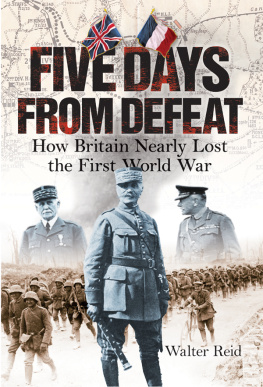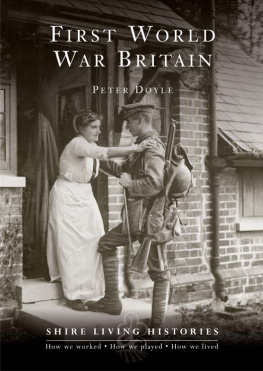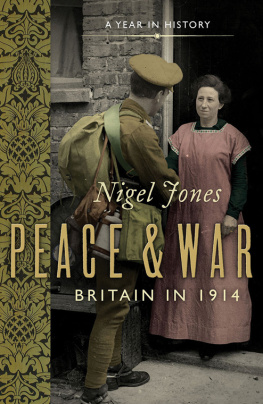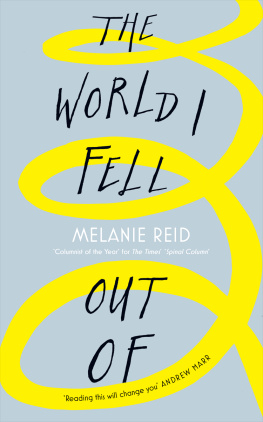Fiona Reid - Broken Men: Shell Shock, Treatment and Recovery in Britain 1914-30
Here you can read online Fiona Reid - Broken Men: Shell Shock, Treatment and Recovery in Britain 1914-30 full text of the book (entire story) in english for free. Download pdf and epub, get meaning, cover and reviews about this ebook. year: 2012, publisher: Bloomsbury Academic, genre: Politics. Description of the work, (preface) as well as reviews are available. Best literature library LitArk.com created for fans of good reading and offers a wide selection of genres:
Romance novel
Science fiction
Adventure
Detective
Science
History
Home and family
Prose
Art
Politics
Computer
Non-fiction
Religion
Business
Children
Humor
Choose a favorite category and find really read worthwhile books. Enjoy immersion in the world of imagination, feel the emotions of the characters or learn something new for yourself, make an fascinating discovery.

- Book:Broken Men: Shell Shock, Treatment and Recovery in Britain 1914-30
- Author:
- Publisher:Bloomsbury Academic
- Genre:
- Year:2012
- Rating:5 / 5
- Favourites:Add to favourites
- Your mark:
- 100
- 1
- 2
- 3
- 4
- 5
Broken Men: Shell Shock, Treatment and Recovery in Britain 1914-30: summary, description and annotation
We offer to read an annotation, description, summary or preface (depends on what the author of the book "Broken Men: Shell Shock, Treatment and Recovery in Britain 1914-30" wrote himself). If you haven't found the necessary information about the book — write in the comments, we will try to find it.
Fiona Reid: author's other books
Who wrote Broken Men: Shell Shock, Treatment and Recovery in Britain 1914-30? Find out the surname, the name of the author of the book and a list of all author's works by series.
Broken Men: Shell Shock, Treatment and Recovery in Britain 1914-30 — read online for free the complete book (whole text) full work
Below is the text of the book, divided by pages. System saving the place of the last page read, allows you to conveniently read the book "Broken Men: Shell Shock, Treatment and Recovery in Britain 1914-30" online for free, without having to search again every time where you left off. Put a bookmark, and you can go to the page where you finished reading at any time.
Font size:
Interval:
Bookmark:
BROKEN MEN
Shell Shock, Treatment and Recovery in Britain
19141930
Fiona Reid
www.bloomsbury.com/thegreatwar 

To Danu and to Norry
Between
.
.
.
.
.
Many people have helped me to complete this book. Professor June Hannam and Dr Mike Richards of the University of the West of England provided much valuable encouragement at an early stage, as did Dr Kent Fedorowich. I am also grateful to Professor Mark Connelly (University of Kent) for his useful advice and keen enthusiasm throughout. It would have been impossible to research or to write this book without the support of my colleagues at the University of Glamorgan. I would like to thank the History division as a whole for providing essential funds for research trips. In particular I am grateful to Dr Sharif Gemie and Dr Brian Ireland for reading early drafts of this work, and I very much thank Dr Jane Finucane for some essential technical assistance. Thanks are also due to colleagues in the English division at the University of Glamorgan, especially Professors Gavin Edwards and Andy Smith.
I am very grateful to Commodore Toby Elliott for allowing me full access to the Ex-Services Welfare Society archives. These archives are held by Combat Stress, the charity that specialises in caring for veterans who have been traumatised by war service. I have quoted extensively from the written material and all the images in this book have been reproduced with Commodore Elliotts kind permission. In addition, I thank Ros Dunn for being so welcoming on my numerous visits to Combat Stress at Tyrwhitt House, Leatherhead. The staff at the National Army Museum have also been extremely helpful, especially Simon Moody who identified the papers of Edwin Blomfield for me.
When writing this book I consulted the letters, diaries and personal papers of many First World War combatants, medical officers and their families. Michael Dible gave me permission to use his fathers papers and Thomas West allowed me to use his fathers diary. I am deeply indebted to them both and wish to thank them for their generosity. Unfortunately I have not been able to trace all of the individuals whose words appear in this book, although I have done my best to do so. In response, I apologise to anyone who feels that their (or their relatives) views have been misrepresented. At all times I have endeavoured to treat all of the individuals concerned with respect and compassion. I hope that this is evident.
Of course I owe the greatest thanks and the greatest love to my immediate family: my partner, Dr Norry LaPorte and my daughter Danu and her partner Joe. All of them have been, and continue to be, quite magnificent all of the time. Thank you.
We are all familiar with the mentally broken soldier of the First World War. The shell-shocked man often the shell-shocked boy who was too traumatized to fight embodies contemporary popular judgements about the First World War: it was too brutal, too cruel and too futile. Men were unable to deal with it. Yet in retrospect, the deeply traumatized First World War soldier is also a strangely comforting figure. It is thanks to this mistreated victim of the trenches that we began to learn the importance of managing trauma. In response to traumatic events such as natural disaster or terrorist attack, we now routinely provide counselling, we recognize grief and we encourage the expression of anxieties. It was the shell-shocked soldier who first began to dismantle the Victorian stiff upper lip, and it was the shell-shocked soldier who refused to fight in this most bloody of wars sometimes paying for this refusal by facing a hasty court martial and an unwarranted execution.
On a popular level there is still widespread agreement that the First World War was pointless in a way that other wars, notably the Second World War, were not. In Britain, the Great War plays a central role in academic and cultural life and in concepts of national identity. There is no antithetical relationship between history and memory; rather, there is a strong symbiotic relationship between popular perceptions of the war and academic history, and the popular understanding of the First World War is largely based upon a shared memory of that particular war as collective trauma. Handals comments perfectly encapsulate much of British public opinion.
These and other popular myths about the First World War have recently been
The idea of the First World War as a futile war has been so pervasive for so long that it has framed the way in which the history of shell shock has developed. This has not always been productive, and Roger Cooter has complained that the Great War has been reduced to the war of shell shock. By reconfiguring the story of shell-shock treatment as the story of an institutional inadequacy conquered, the RAMC fosters a sense of its own progress narrative. In addition, it is not simply that the story of shell shock has now come to dominate First World War narratives, but that shell shock, that is, psychological collapse during warfare, is generally seen as a particular reaction to the unprecedented horrors of one unusual war. This highlights the supposedly unique nature of the First World War but obscures the longer and more complex history of mens responses to warfare and of mental collapse more generally.
It is important to stress two points in order to contextualize mental breakdown in warfare. First, most men did not become psychological casualties during the First World War; rather, most men dealt reasonably well with the stresses and strains of intense warfare. It is clear that men have long had complex responses to the stress of battle, and a few examples will suffice to illustrate this point.
In November 1794, Major Watkin Tench was a marine serving in the Royal Navy. Britain was at war with revolutionary France and Tenchs ship was captured, leaving many men wounded. Was Tench unmanned by his war service? War is ostensibly, and historically, the most masculine of activities, yet men have often been represented as emasculated or feminized by war and like Tench of being unable to find the words to communicate their responses.
One of the most famous literary examples of the old soldier is surely Tristram Shandys Uncle Toby. Captain Toby Shandy received a groin wound at the siege of Namur when a large stone fell from the parapet and crushed his pubic bone. In the course of his long and painful convalescence, Uncle Toby was plagued by visitors who were unable to understand his war stories. In response, Toby and his man Trim his old corporal from the campaigning days decided to recreate sieges in the grounds of the family estate. There is a stark contrast between Uncle Tobys inability to describe his campaigns and the extraordinary attention to detail that he and Trim display when constructing ravellins, bastions, curtins, hornworks and so forth. Uncle Toby is obsessed by his war, but he cannot talk about it; he re-enacts his war because of his inability to describe it.
This sense of being dominated by war memories and by an inability to articulate them continues. In February 2009, Lance Corporal Johnson Beharry, a highly decorated Iraq war veteran, received much media coverage for his story of his own war neurosis and his comments on the poor treatment available to mentally wounded veterans via the National Health Service. On the Today programme, Beharry told listeners, I didnt know I would get worse.
Next pageFont size:
Interval:
Bookmark:
Similar books «Broken Men: Shell Shock, Treatment and Recovery in Britain 1914-30»
Look at similar books to Broken Men: Shell Shock, Treatment and Recovery in Britain 1914-30. We have selected literature similar in name and meaning in the hope of providing readers with more options to find new, interesting, not yet read works.
Discussion, reviews of the book Broken Men: Shell Shock, Treatment and Recovery in Britain 1914-30 and just readers' own opinions. Leave your comments, write what you think about the work, its meaning or the main characters. Specify what exactly you liked and what you didn't like, and why you think so.







